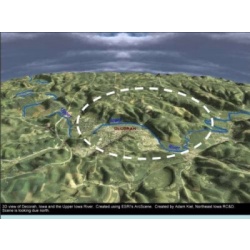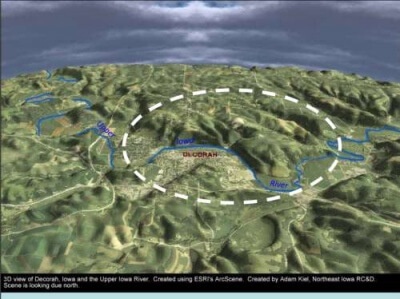
Winneshiek County agrees to enter into program to explore questions regarding implications of large-scale underground mineral mining
At the Winneshiek County Board of Supervisors meeting Monday, members unanimously voted to enter into an agreement with the University of Iowa's Community Empowerment Law Project (CELP) to learn more about implications of deep mineral mining in northeast Iowa. The agreement with CELP, which was unanimously approved by the Winneshiek County Board of Supervisors, was proposed by Winneshiek County Supervisor Dean Thompson.
According to the agreement, "(University of Iowa) College of Law students in the Community Empowerment Law Project (CELP) will conduct a study to help officials in Winneshiek County and Northeast Iowa understand the implications of anticipated mineral activities, as well as legal safeguards for environmental protection and transfer of wealth." Winneshiek County will pay the University of Iowa Office of Outreach and Engagement $1,000 for this service.
Thompson, who serves as Vice Chairman of the Winneshiek County Board, initiated the project when a recent Iowa Geological Survey found evidence of a possible underground mineral deposit encompassing 10 counties in northeast Iowa. Further study of the 10-county northeast Iowa region is required to evaluate the mineral formation's possible value, but some geologists have compared it to the Duluth Complex, a large formation of underground minerals in Minnesota worth billions of dollars.
With growing international demand for valuable minerals like copper, nickel, and platinum, the Duluth Complex has brought jobs to Minnesota--and hundreds of millions of dollars. If the 10-county Northeast Iowa region proves similar to the Duluth Complex in age and composition, it could have minerals worth $1 trillion.
Despite the economic boon from the northeast Iowa site, in his presentation before the board, Thompson cautioned there are many local and regional factors involved in large underground mining operations. The northeast Iowa underground mineral deposit encompasses 10 counties; most of that property is private.
A large mining operation in northeast Iowa would undoubtedly strain roads. However, unlike, Wisconsin and Minnesota, Iowa doesn't have a road use tax. Thompson argues this would mean the cost of road repair would fall to the taxpayers.
Thompson will serve as the project lead on behalf of Winneshiek County, serving as the primary point of contact for the third-year law students who will be analyzing the legal and environmental implications of large-scale underground mining activity.
The law students will review local county ordinances about mining and zoning, evaluate practices regarding regulation and taxation of underground mineral mining, and explore ways to keep economic gains locally.
In a report distributed at the supervisors meeting, Thompson wrote, "(Our) primary concern is maintaining local control of mining-related questions, ensuring each county makes an informed decision about permitting or prohibiting mining operations, and, if mining occurs, having laws and policies in place to keep the economic benefits of mining in local communities."
Site designed and maintained by Iroc Web Design Services©.
Your Small Business Web Design Solutions.™


